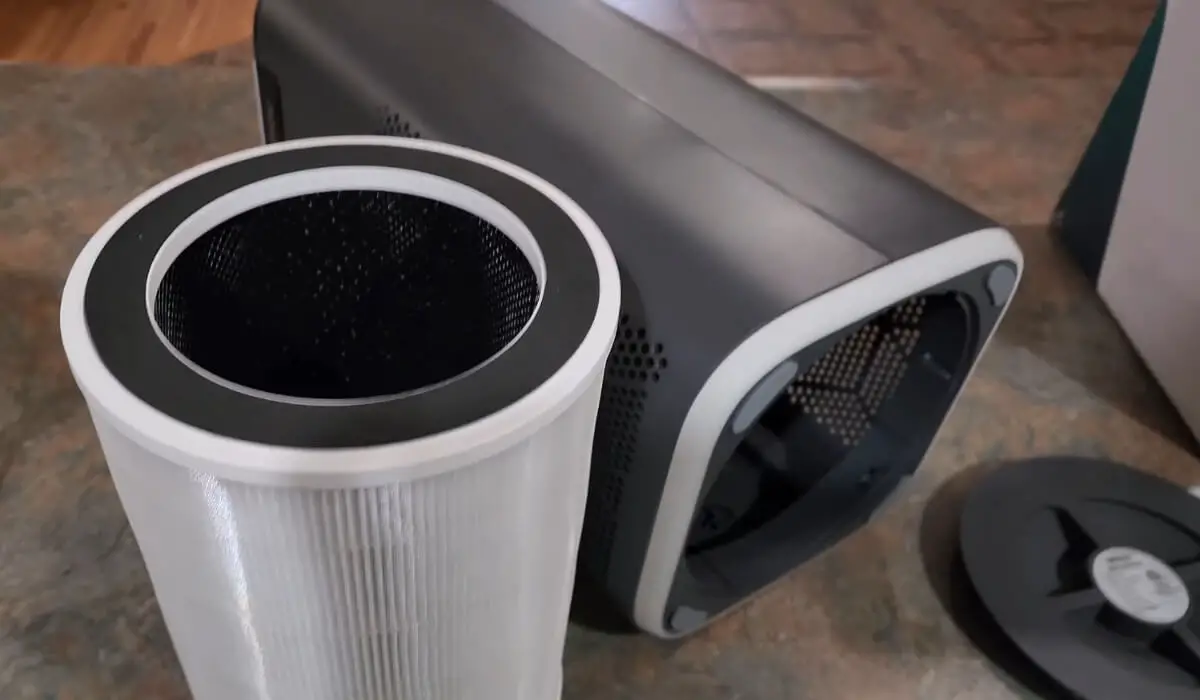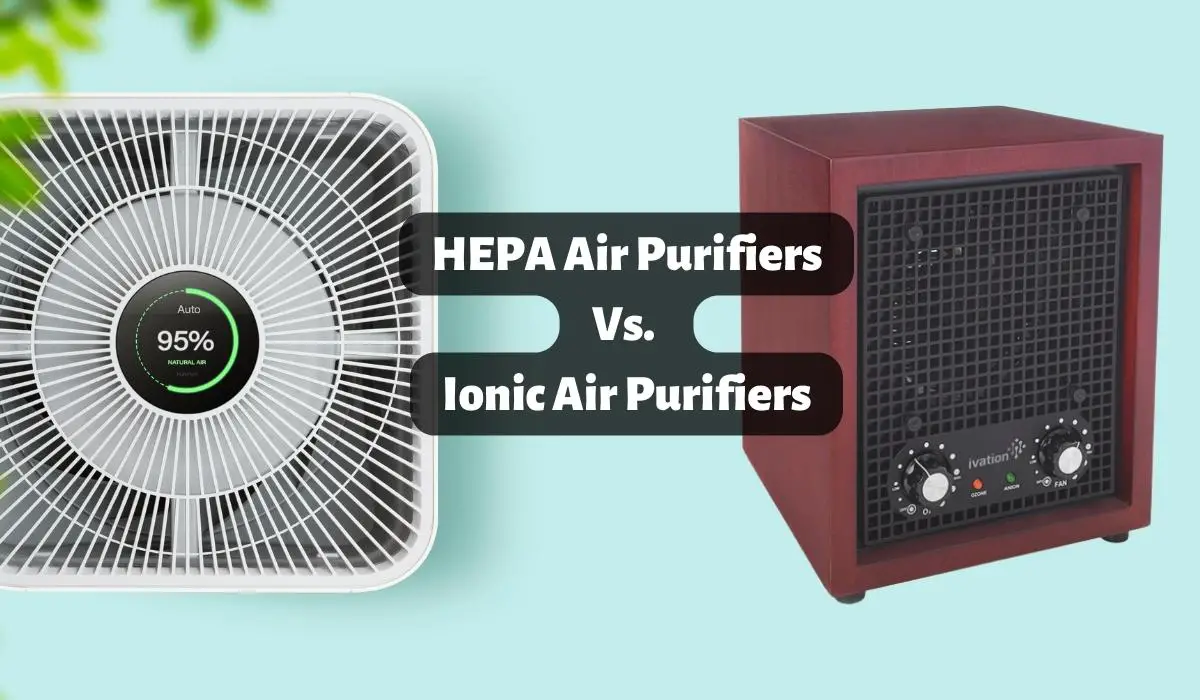Last Updated on April 7, 2024
Our world is suffering from pollution, and there is no denying that. Even for environmentally conscious people, there is no hiding from it. Now, if you want to contain and shield yourself from air pollution, you better start working from your home first. Air purifiers can be an excellent starter to give you a healthier environment.
Now you might be wondering what purifier to get, as there are two common variants in the market. This is why we came up with the Hepa Vs. Ionic purifiers comparison to give you a clearer picture of how they work and which one you should get.
So, without further ado, let’s dive into the discussion. By the end of this article, you will be able to decide which one suits you best.
What Is a HEPA Purifier?
A Hepa Purifier helps to eliminate harmful particles from the air. It uses a high-efficiency particulate absorbing filter to trap dust, bacteria, pollen, mold, and many others that are 0.3 μm diameter.

HEPA Purifier is known for its efficiency and its 99.97% filtration rate, according to the U.S. DOE. This type of filter can also tackle viruses, microorganisms, and even floor dust. In the next section, you will see how it works.
How Does HEPA Purifier Function?
HEPA purifiers use high-efficiency particulate arrestance filters to resist viruses, bacteria, dust, and others. It has an interwoven filter that allows the air to pass through. This is where the dust and bacteria are treated.
First up, the air is pulled into the air filter. The initial block comes from the first layer, which is known as a pre-filter. Here all the large particles are trapped, and then the rest (odor compounds) are passed to the next filtration.
Secondly, there is a carbon filter that helps to take off the odors from the air being filtered. Then it passes onto the final layer (HEPA filter), which can tackle even the smallest particles. Finally, it passes through the fan, and the clean air is channeled to your home.
Note: When HEPA filters catch excessive dirt and debris, they will jam and might not be able to purify or circulate the air properly. This is why you must always maintain the HEPA filter from time to time.
Replacing the filters every 6 months is ideal. Try to avoid washing the filter, and it’s better to replace them once the filter gets too dirty. You might want to check out the different types of HEPA available.
Benefits of HEPA Filter
● Super-efficient in capturing large to small particles
● Backed by U.S DOE and ISO to eliminate 99.97% of harmful particles
● Excellent odor neutralizer. Keeps your home fresh and odor free
● Superior cleansing helps soothe asthma and allergies
● Does not channel any byproducts, is safe to use
● HEPA filters can be fitted on different home appliances
Drawbacks of HEPA Filter
● It will not catch extra small particles below 0.3 microns
● HEPA doesn’t work on Formaldehyde or VOCs (Volatile Organic Compounds).
Note: To counter VOCs, you may want to check out products with Pro Cell Technology air filtration.
What Is Ionic Purifier?
This purifier uses an ionizing technique to disturb the contaminants in the air. Yes, it uses electricity to work. Also known as negative ion generators or ionizers, this device induces a static charge that latches on to the contaminants. As the particles clump onto the static charge, they get heavy and drop down.
Keep in mind that the most commonly used ionic purifiers (ionizers) won’t flush out the contaminated air particles like a HEPA purifier; rather, the pollutants get heavy and settle on nearby household surfaces. Dusting or vacuuming can activate the particles yet again.
On the other hand, Electrostatic precipitators work differently.
How Does Ionic Purifier Work?
Now that you know what an ionic purifier is, you should also know how this variant works.
One with Charged Plates
This one has a fan that brings the air toward an ionizer. Here the purification process begins. As the air passes through the ionizer, the particles will interact with the negative charge and wind up with one another.
Next, they travel through a positively charged plate that will eventually attract the negative particles, leaving the uncontaminated air free to pass out from the purifier to your home environment.
Facts: Electrostatic precipitators are not the best solution for eliminating harmful particles. As it works using charged plates, sometimes it can fail to accumulate large contaminants; therefore, the outcome might not be pollution free.
Dirty plates can be a menace. When the plates catch excessive dirt, they won’t function properly. You should maintain such an ionizer device on a regular or monthly basis.
Conventional Ionizers
This is the most common form of ionizer out there. It doesn’t have a fan to work with; just the emission of negative ions can do the trick here. This is how it runs:
First, the ionizer will generate negative charge ions and emit them into the open air. As the charges move within the environment, they catch particles from the open air.
This accumulation makes the negative ions heavier, and therefore they can’t stay in the open air. The charged particles fall or simply get attached to nearby household items.
Facts: As we said, the negatively charged particles will drop down or stick to nearby surfaces. It can severely contaminate your wall, carpets, or curtain. Even your cell phones or laptops might top up some of the particles without you realizing it.
Benefits of Ionic Purifier
● Affordable compared to other types of purifiers
● Compact and easy to carry
● No filters mean no cleaning is required
● It can be used on cars
Drawbacks of ionic Purifier
● Not ideal for large particles. Cant tackle Vocs or eliminate odors
● Produces ozone, which can harm the environment and your lungs
● Contaminants settle on the surface and can be triggered again by dusting
What Separates Ionic and HEPA Purifiers?
HEPA purifiers use a filter to take out harmful particles from the air and then move the clean air via the fan. Whereas the Ionic purifier doesn’t have any filter to work with; instead, they run electricity to create negative ions that are emitted into the air.
The negative charges catch dust, pollens, bacteria, etc., and latch onto the nearby surface (ground, wall, curtains), ultimately giving you fresh, moving air.
How Do They Compare to One Another? Which One to Get?
When compared to one another, we would give a thumbs up to HEPA purifiers because of their overall work rate and effectiveness. Let’s bring them head to head:
Pricing
This is where ionic purifiers take the win. It has a lower price in comparison to HEPA purifiers.
Maintenance and Size
In terms of size, the ionic purifier is pretty handy and can be moved from one place to another. It doesn’t have a fan, so the maintenance is minimal to none.
HEPA filters can come in varying sizes, from small to big ones. They do need proper care as dust and debris can block the filtration easily. You will need to replace the filter quite often.
Treating Harmful Particles
A purifier has to be effective in tackling dust, virus, bacteria, microorganism, etc. This is where HEPA filters can work best. 3-stage filtration not only eliminates large and small particles but also takes out the odor from the air.
Ionic purifiers are small and cost-effective but might not be the best in terms of treating air pollution. It does a fine job dealing with smoke and some particles but will likely miss out on removing all of the harmful particulates in the air.
Moreover, the charged particles won’t vanish completely; rather, they will stick to the surface of your household items. This particular drawback allows HEPA filters to take the lead.
Reliability and Safety
HEPA filters are backed by the U.S. DOE and are trusted when it comes to purifying the air. Known to remove 99.97% of contaminants, it surely overpowers Ionizers.
More importantly, there are safety concerns with Ionizers as they produce ozone, which is known to increase air pollution and is harmful to humans.
Takeaways: HEPA purifiers are more effective and will remove contaminants from the air better than ionizers. It can suit large indoor spaces without much fuss.
Ionizers will remove some harmful air particles but will accumulate dust on the ground, desk, and curtains, which ultimately is a downgrade. Ionizers are suited for mild purification and can work better in smaller areas like car interiors, small rooms, etc.
Frequently Asked Questions
- Which is better, HEPA or Ionic Air Purifier?
HEPA!! They can productively filter the contaminants and give you cleaner, uncontaminated air. Ionizers, on the other hand, are ideal for subtle tasks, but they are notorious for missing out on bigger particles. More importantly, with ionizers, you will have to dust or vacuum the ground, carpets, and curtains regularly.
- Are Ionic Air Purifiers effective?
When it comes to taking out harmful particles, they are not the best, just below average. Some manufacturers will claim that they can take out microscopic specs, which can be a lucrative offer, but eventually, they will hoard the particles on the ground.
All in all, we don’t find it to be effective if you have to keep your hands busy in cleaning.
- Is there anything better than a HEPA filter?
Ultra-low particulate air filters can be an upgrade to HEPA. They have a 99.99 % filtration rate and can eliminate even smaller particles than HEPA filters. ULPA has dense filters on them, which can lower the usual airflow and will need extra power to channel the air.
- Which is better, HEPA filter or Electrostatic?
Electrostatic precipitators use positively charged plates to attract negative particles. In many cases, the plates might not be powerful enough to attract all the particles; therefore, you will end up with contaminated air in your room.
HEPA filtration is a workhorse and will trace out the majority of the contaminants, unlike electrostatic precipitators. If you are wondering about VOCs, then Pro-Cell technology can help.
Conclusion
When it comes to enjoying clean air quality in your home, there is no better alternative than using a purifier. Most homeowners have been wondering which purifier to get and whether they should purchase an ionic device to clean the air or not.
If you have gone through this HEPA vs. Ionic Air purifiers comparison, then the answer is pretty clear. We lean towards HEPA purifiers because they can filter better than Ionizers. There are no byproducts from HEPA filters, and they are safe for public use. Then there is the odor neutralizer which is a game changer.
HEPA purifiers are a little costly compared to Ionizers, but with this kind of positive outcome, there is nothing to complain about. Get yourself a HEPA purifier and reduce indoor pollution like a boss.
